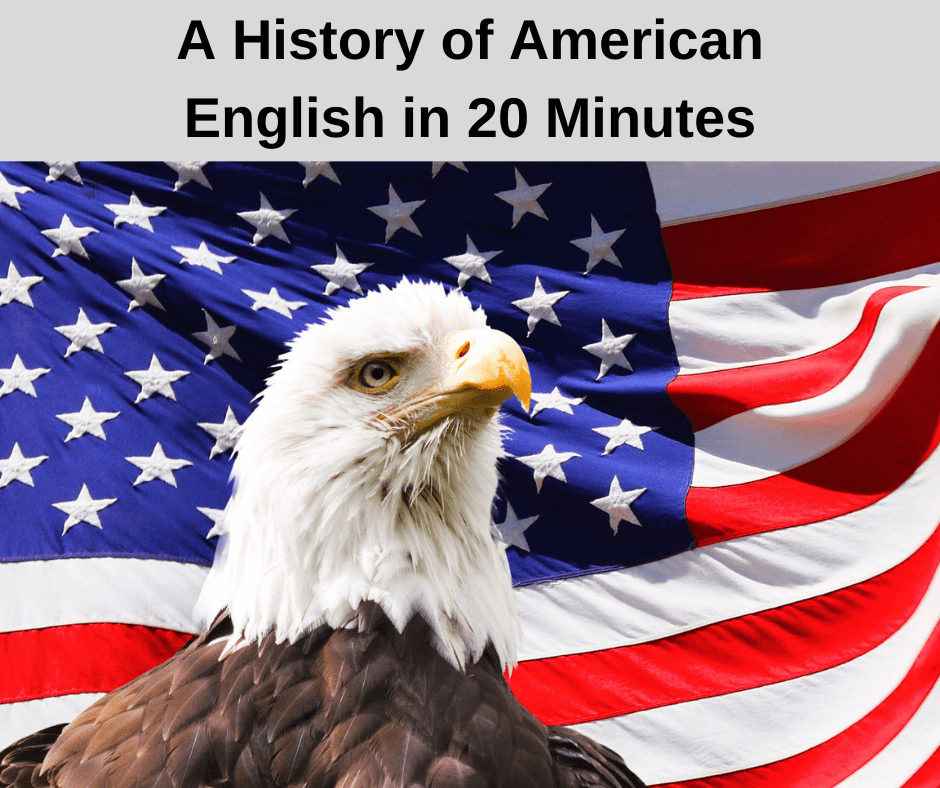
George Bernard Shaw said, “The United States and Great Britain are two countries separated by a common language.”
Oscar Wilde wrote, “We have really everything in common with America nowadays, except, of course, language.”
But what happened over time to make American English so different from British English? You’ll find out in this episode.
Voice message from Alberto from Milano
British and American English vocabulary differences: https://inglespodcast.com/288
British and American English pronunciation differences: https://inglespodcast.com/81
Mansion interviews Danny about British and American vocabulary
A History of American English
British English first arrived in North America in 1605 when 3 ships docked in Jamestown, Virginia. It was called Jamestown after King James I.
The Mayflower, full of English Puritans, arrived at Cape Cod, Massachusetts, in 1620, and over 200 ships followed, settling all along the East coast.
Many French arrived and settled along the St. Lawrence and the Mississippi rivers. New Orleans, Louisiana (named after Louis XIV) became a centre for French culture.
The Dutch landed on the East coast and founded New Amsterdam (the British forced them to change the name to New York in 1664).
The Dutch introduced coleslaw (ensalada de col) and cookies (galletas) into American English.
The Germans, mainly Bavarians, settled in Pennsylvania. They gave pretzels and delicatessen to the language.
Italians also arrived bringing pizza, pasta, zucchini and Mafia.
A melting pot – a fusion of cultures (crisol in Spanish)
North America become a melting pot and American English became influenced by the Irish, Italians, Africans (through the slave trade), Jewish, Spanish and many more.
Many words were borrowed from the Native Americans.
These early pioneers needed words to talk about the different weather, animals, plants etc that they saw. Examples are racoon (mapache), squash (calabaza) and moose (alce)
Less than half of the names of the 50 states that make up the USA have English language origins! For example, from Spanish: Colorado (coloured red like the Colorado River), Montana (an anglicization of montaña), Nevada (snow-capped), etc. Also, Hawaii (Hawaiian Polynesian language) and Louisiana (named after King Louis XIV of France).
Above all, the Native American Indian languages have been anglicized for place names. For example, Connecticut (Algonquian language – beside the long tidal river), Kentucky (Iroquoian language – land of tomorrow), North & South Dakota (the Dakota tribe), Minnesota (Dakota language – sky-tinted water), Missouri (Missouri language – town of large canoes), Massachusetts (Massachusett language – people of the great hills), etc.
Samuel Johnson published his Dictionary of the English Language in 1755, and a year later Johnson officially recognized the ‘American Dialect’.
Examples of words that were not in common usage in England, but were commonly used in the US include:
allow, guess, reckon
fall, meaning “autumn”
gotten, where “got” was being used as the past participle of “get.”
In 1802, the United States Congress recorded the first use of the phrase “the American language”.
After the First World War, North Americans were very patriotic. In 1923, in the State of Illinois General Assembly, they passed an act that said, in part:
‘The official language of the State of Illinois shall be known hereafter as the “American” language and not as the “English” language.’
However, there is no official (federal) language of the USA, although 31 states have laws recognising it as official in those states. Three states have other official languages in addition to English: Hawaii Pidgin English, Sioux in South Dakota and around 20 indigenous languages in Alaska. Though French is extremely important in the culture and history of Louisiana, it in fact isn’t recognised as an official language.
American capitalism brought new words into English (to break even, bottom line, blue chip, merger and downsizing.
American English drifted back across the pond through movies, music, the Internet and globalization bringing the English language, And English-American culture, very close together.
…and now that you’ve listened to us, we want to listen to you. go and record a sentence or two and send us a voice message using…..https://www.speakpipe.com/inglespodcast
Send us an email with a comment or question to [email protected] or [email protected].
Visit our online store: https://store.mansioningles.net/
Thank you to all of you who are helping us by supporting this podcast. You can see a list of all our Patreon supporters at Patreon.com/inglespodcast
Welcome to our new Patreon supporters who have joined us this month:
Jessika Ramos
jose Vazquez
Roque Montiel
Luis Gil
Join our Patreon program for a minimum of $1per month (+ VAT) and you get instant access to recent transcriptions. https://www.patreon.com/inglespodcast
Would you like an email every time a transcription is published?
On next week’s episode: Pace in English
The music in this podcast is by Pitx. The track is called ‘See You Later’



